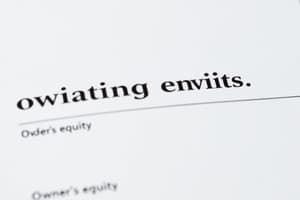Podcast
Questions and Answers
According to the revenue recognition principle, when should revenue be recorded?
According to the revenue recognition principle, when should revenue be recorded?
- When cash payment is received.
- When a customer places an order.
- At the start of a project.
- When the service has been performed. (correct)
Which principle dictates that expenses must be recorded in the same period as the revenue they helped to generate?
Which principle dictates that expenses must be recorded in the same period as the revenue they helped to generate?
- Matching Principle (correct)
- Accrual Accounting Principle
- Revenue Recognition Principle
- Cost Principle
If a company receives cash for services that have not yet been performed, how is this recorded?
If a company receives cash for services that have not yet been performed, how is this recorded?
- As a debit to revenue.
- As a credit to cash.
- As an expense.
- As unearned revenue. (correct)
A company pays for a one-year insurance policy in advance. How will this be treated at the time of payment in the company's accounting records?
A company pays for a one-year insurance policy in advance. How will this be treated at the time of payment in the company's accounting records?
A company starts the year with $3,000 in supplies and purchases an additional $2,000. At the end of the year, there are $1,000 of supplies left. What entry should be made to adjust supplies?
A company starts the year with $3,000 in supplies and purchases an additional $2,000. At the end of the year, there are $1,000 of supplies left. What entry should be made to adjust supplies?
A company receives $600 for a six-month service that starts on November 1st. If the company ends their fiscal year on December 31st, what will be the journal entry to adjust the unearned revenue?
A company receives $600 for a six-month service that starts on November 1st. If the company ends their fiscal year on December 31st, what will be the journal entry to adjust the unearned revenue?
Which type of accounting recognizes revenues when cash is received and expenses when cash is paid?
Which type of accounting recognizes revenues when cash is received and expenses when cash is paid?
A company receives a $200 invoice for utilities for the previous year on January 10th. How should this be recorded in the company's accounting records?
A company receives a $200 invoice for utilities for the previous year on January 10th. How should this be recorded in the company's accounting records?
Flashcards
Revenue Recognition Principle
Revenue Recognition Principle
Recognizing revenue when it is earned, even if cash is not received immediately. It ensures financial statements reflect the company's performance accurately.
Matching Principle
Matching Principle
Matching expenses with the revenue they helped generate in the same accounting period. This provides a true picture of profitability.
Unearned Revenue
Unearned Revenue
A liability representing revenue received but not yet earned. It is adjusted as services are performed.
Prepaid Expenses
Prepaid Expenses
Signup and view all the flashcards
Cash Accounting
Cash Accounting
Signup and view all the flashcards
Accrual Accounting
Accrual Accounting
Signup and view all the flashcards
Adjusting Entries
Adjusting Entries
Signup and view all the flashcards
Supplies Adjustment
Supplies Adjustment
Signup and view all the flashcards
Study Notes
Key Accounting Principles
- Revenue Recognition Principle: Revenue is recorded when earned, not when cash is received.
- Matching Principle: Expenses are recorded in the same period as the revenues they generate.
- Unearned Revenue: Payment received before a service is performed; adjusted when the service is completed.
- Prepaid Expenses: Payment made in advance for a service; expense is recorded as service is used.
Cash vs. Accrual Accounting
- Home Renovation Example: In year 1, expenses are paid but revenue isn't.
- Accrual Basis: Recognizes revenue upon job completion, in this case revenue is recorded in year 1, $110,000
- Cash Basis: Recognizes revenue on cash receipt; $0 of income is recorded in year 1, $110,000 in year 2.
Adjusting Entries
- Purpose: Update accounts at period-end to reflect correct amounts, before financial statements are prepared.
Supplies Adjustment
- Example: Beginning supplies (5,000), Purchases (2,000), Ending supplies (3,000).
- Supplies Used Calculation: (5,000 + 2,000) - 3,000 = $4,000
- Journal Entry: Debit Supplies Expense $4,000; Credit Supplies $4,000
Prepaid Expenses Adjustment
- Prepaid Expenses: Expenses paid in advance.
- Example: One-year insurance policy ($3,600), purchased March 1st, year ends December 31st.
- Used Portion Calculation: (10 months/12 months) * $3,600 = $3,000
- Journal Entry: Debit Insurance Expense $3,000; Credit Prepaid Insurance $3,000
Unearned Revenue Adjustment
- Unearned Revenue: Revenue received before service is performed.
- Example: Customer pays $1,200 for 3 months of driveway plowing, year ends December 31st.
- Earned Revenue Calculation: ($1,200 / 3 months) * 1 month = $400
- Journal Entry: Debit Unearned Revenue $400; Credit Service Revenue $400
Late Arriving Invoices Adjustment
- Example: 2017 invoices arrive in 2018: Telephone bill ($120), Utility bill ($230).
- Journal Entry: Debit Telephone Expense $120; Debit Utilities Expense $230; Credit Accounts Payable $350 (assuming the bills weren't previously recorded).
Studying That Suits You
Use AI to generate personalized quizzes and flashcards to suit your learning preferences.




